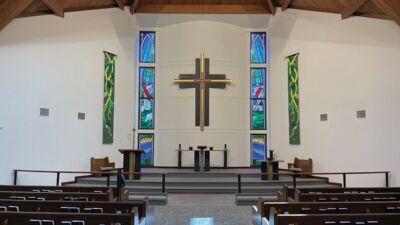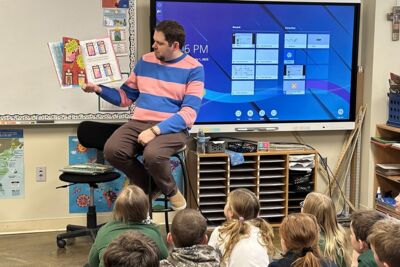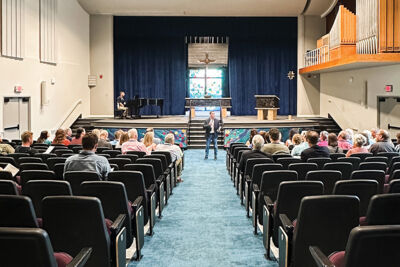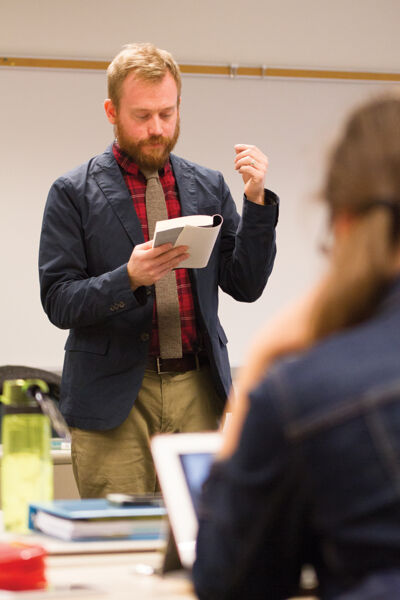
The Light We Shine in His World
Story: Danielle Luebbe
Photos: Courtesy Concordia's Institutes
Concordia’s institutes serve the church and world through their impact.
As a mission-focused institution, Concordia University, Nebraska serves our church and communities through multiple programs and institutes. Each institute operates independently. However, Concordia’s institutes must align with the overall mission of the university, serve an audience beyond campus, engage Concordia students in some part of its work and maintain a model for independent financial viability.
Concordia’s institutes are designed to reflect God’s light through the service they provide.
Center for Liturgical Art
The Center for Liturgical Art (CLA) is dedicated to creating art for worship and witness while advocating for visual arts in Christian life and practice. As a group of artists who share the importance of ecclesiastical art and the impact it has on our lives as Christians, the CLA works to spread the message of the Gospel through art.
“CLA is an organization dedicated to serving as a resource to churches and to mentoring a new generation of artists in the Church,” said operations manager Evan Balleweg.
In addition to stained glass, furnishings, crosses and mosaic pieces completed for churches, schools and other Christian organizations, the CLA recently completed liturgical furniture for the LCMS Youth Gathering in 2022 and is currently working on a piece for the Borland Center for Music and Theatre on Concordia’s campus commemorating the four directors of the University A Cappella program.
Visit liturtgicalart.org to view past projects and learn more.
Institute for Ethical Leadership
The Institute for Ethical Leadership (IEL) provides Concordia students with a hands-on and Christ-centered academic experience that is centered around ethical leadership while helping them build a path to become leaders of organizations after graduation.
“Through clinics, events and leadership opportunities, students learn to serve the church and their communities and become influential difference makers in their work and world,” said Dr. Curt Beck, professor of business administration.
Some of the current opportunities available to students include the Leadership & Ethics Symposium, Women in Business Luncheon, Collegiate Leadership Competition team, 10:31 Coffee Shop, Business as a Mission, Business Club and partnerships with local, ethical organizations such as People’s City Mission of Lincoln, Nebraska.
Institute for Innovation and Entrepreneurship
The Institute for Innovation and Entrepreneurship (IIE) gives Concordia students the opportunity to create their own business and carry it through from inception to launch.
“Students can graduate and be prepared to actually start their business,” said Todd Johnson, assistant professor of business administration. “A lot of the barriers that often prevent entrepreneurs from following through on their business ideas, including financial barriers, will be removed.”
Current students can participate in the Concordia Catalyst Competition, a pitch and business plan competition that allows them to see first-hand the work that goes into developing a business plan. They also work with local community businesses to do SWOT analyses and create feasibility studies and financial business plans, as well as marketing campaigns.
In the near future, as the IIE continues to grow, students will be able to pitch their businesses to a team of investors, compete in national entrepreneurship competitions and have the support they need to create, launch and maintain a successful business.
Learn more about Concordia’s business programs at cune.edu/business.

The Institute of Literacy Programming and Outreach
Launching in 2024, the Institute of Literacy Programming and Outreach (ILPO) will focus on the ever-changing landscape of children’s literature and effective literacy instruction, and how Concordia can continue to support children, teachers, schools, families and communities.
“Currently, as it is proposed, the Institute for Literacy Programming and Outreach (ILPO) will serve various populations within the church, home and world by providing high quality programming and networking opportunities for individuals to delve into the rich gift God gave us through the various facets of literacy,” said Dr. Dylan Teut, director of literacy programming and outreach.
Concordia’s Plum Creek Literacy Festival will continue as part of the Institute of Literacy Programming and Outreach. In recent years, the literacy festival has expanded the festival and its outreach. Most recently, a satellite festival was established in partnership with the Lozier Foundation and Nelson Mandela Elementary School in Omaha, which brings together authors of color, students in Title I Omaha elementary schools and Concordia University students in the education program.
Visit cune.edu/plumcreek to learn more.

Insitute for Religious Education
The Institute for Religious Education (IRE) was established in 2006 to enhance the intentionality and effectiveness of Christian educational efforts in churches.
“At its core, the Institute for Religious Education focuses on issues and priorities that have long been the cornerstone of Concordia’s mission – how do we do the best job possible of helping the church to more intentionally focus on equipping the people of God through educational efforts,” said Dr. Mark Blanke, director of the Institute for Religious Education.
In addition to providing resources and research for use by professionals and laity in churches and schools, the IRE hosts a biennial conference designed for individuals working in parish education in the church, the purpose of which is to help participants gain a better understanding, passion and ability to develop a ministry community. Future plans for the IRE are to develop a resource that will assist congregations in enhancing their adult educational ministries.
Find more information at cune.edu/IRE.
Institute for Rural and Small Town Ministries
Concordia’s Institute for Rural and Small Town Ministries (IRSTM) was established in 1984 through the establishment of a generous endowment as a way to support and partner with small, rural congregations. When The Lutheran Church—Missouri Synod initiated a Synod-wide rural and small town ministry emphasis and office with a director, the activity of Concordia’s institute was suspended, though scholarships for Concordia students going into rural and small-town ministry remained available.
Beginning this year, the IRSTM will be reinvigorated by Rev. Russ Sommerfeld, who will serve as interim director, as part of Concordia’s emphasis on university outreach to bless audiences beyond the campus community with the knowledge, wisdom, and gifts of the Concordia community.
“God is giving Concordia Nebraska an opportunity as the only Concordia in a small town and rural setting with growing agriculture science and agricultural education programs to restore its rural and small town ministry institute,” said Sommerfeld. “The Institute for Rural and Small Town Ministries will bring together church work and lay leaders in rural and small town ministry to partner with Concordia in finding ways to serve rural and small town LCMS congregations, early childhood centers, schools and their pastors, teachers, and lay workers.”

Trinity Academy
Trinity Academy is a Lutheran microschool rooted in a classical liberal arts educational tradition launching in fall 2023 on Concordia’s campus. As a private, intentionally small high school operating under a distinct educational model, Trinity Academy will offer a classical curriculum that is Christ-centered and promotes a biblical understanding of self, neighbor and world.

As an institute of Concordia, Trinity will operate independently, but will offer undergraduate students from the university the opportunity to observe and gain hands-on experience in a liberal arts and sciences institution. Presently, the academy plans to cap enrollment at less than 50 students. Not seeking to compete with area schools but to instead offer a distinct education for interested families, the new Trinity Academy is designed to serve a population that is specific and distinct from other local high schools.
“We are excited that Trinity Academy will provide a Christian high school option for families in the area,” says Dr. Gabriel Haley, Board President for Trinity Academy. “We are prioritizing the study of foundational sources in a context where students will be individually and personally motivated in the pursuit of goodness, truth, and beauty.”
Learn more at trinityacademycune.org.